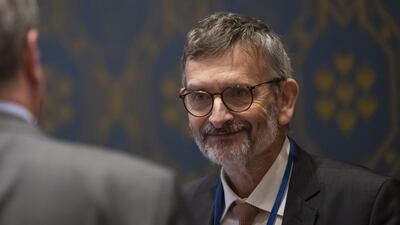Volker Perthes, the UN special representative for Sudan, told the Security Council on Wednesday that he plans to step down, warning the country may be heading towards full-blown civil war.
“I have had the privilege to serve as the United Nations Secretary General’s special representative for Sudan for more than two and a half years,” he told the 15-member council.
“I am grateful to the Secretary General for that opportunity and for his confidence in me, but I have asked him to relieve me of this duty. This will therefore be my last briefing in this function.”
Mr Perthes's resignation comes three months after the Sudanese government declared him persona non grata as it pushed to have him removed from his position.
Sudan's military chief, Gen Abdel Fatah Al Burhan, blamed the envoy last month for exacerbating fighting between the army and the paramilitary Rapid Support Forces, led by Gen Mohamed Dagalo.
In a letter to Secretary General Antonio Guterres, Gen Al Burhan accused Mr Perthes of bias and of not respecting Sudan's “national sovereignty”.
He said the envoy presented a misleading picture of “consensus” in his reports to the UN.
Mr Guterres told reporters that he had approved Mr Perthes's resignation, acknowledging he has "very strong reasons to resign and I have to respect his will".
The country descended into chaos in mid-April when fighting erupted between the RSF and the Sudanese military. Hundreds of thousands have been displaced and ethnic-based violence has been reported in the restive Darfur region.
In his final briefing to the council, Mr Perthes warned that the fighting in the country “shows no sign of abating while neither side appears close to a decisive military victory”.
“What started as a conflict between two military formations could be morphing into a full-blown civil war.
“Civilians have been targeted on an ethnic basis and driven out of El Geneina and other locations in Darfur. In the west, cross-border mobilisation of Arab tribes is further fuelling the conflict and impacting regional stability.”
He was particularly concerned by the mobilisation of former regime elements “advocating for a continuation of the war”.
“Both sides’ military leaders are needed to negotiate and implement cessation of hostilities. But military leaders should not continue to rule the country,” he said.
"We need to impress on the warring parties that they cannot operate with impunity, and there will be accountability for the crimes committed."
Last month, during a UN briefing on Sudan, Mr Perthes was notably absent. The US accused Sudan of issuing threats to expel the UN mission from the country.
The Sudanese ambassador disputed these allegations.
In a joint statement released on Wednesday, leaders of more than 50 international human rights groups urged the Security Council to move from talk to action on Sudan.
"The consequences of not acting are too grave to imagine," it read.
Tirana Hassan, the executive director of Human Rights Watch, said the council has failed in its duty to "robustly respond" to the increasing atrocities in Sudan.
“The world’s foremost body on international peace and security should not remain silent in the face of grave international crimes,” she said.


